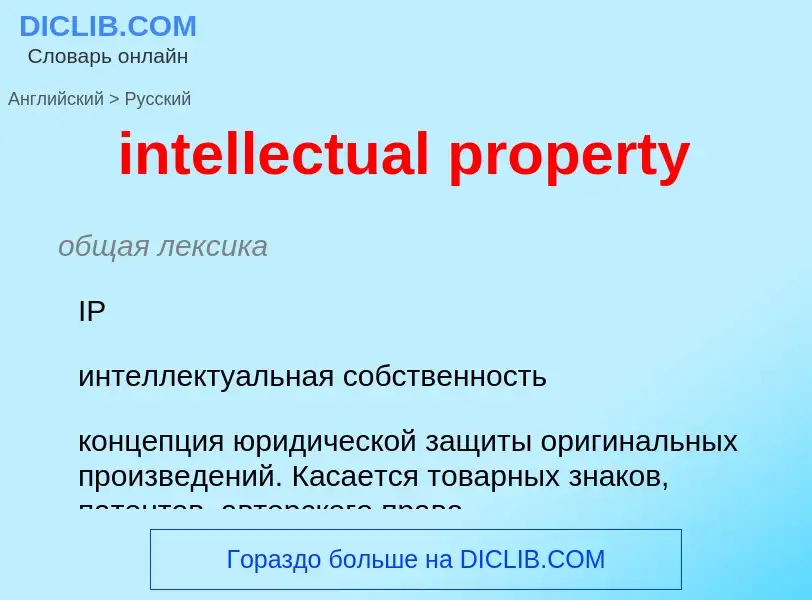Übersetzung und Analyse von Wörtern durch künstliche Intelligenz ChatGPT
Auf dieser Seite erhalten Sie eine detaillierte Analyse eines Wortes oder einer Phrase mithilfe der besten heute verfügbaren Technologie der künstlichen Intelligenz:
- wie das Wort verwendet wird
- Häufigkeit der Nutzung
- es wird häufiger in mündlicher oder schriftlicher Rede verwendet
- Wortübersetzungsoptionen
- Anwendungsbeispiele (mehrere Phrasen mit Übersetzung)
- Etymologie
intellectual property - Übersetzung nach russisch
Wikipedia

Intellectual property (IP) is a category of property that includes intangible creations of the human intellect. There are many types of intellectual property, and some countries recognize more than others. The best-known types are patents, copyrights, trademarks, and trade secrets. The modern concept of intellectual property developed in England in the 17th and 18th centuries. The term "intellectual property" began to be used in the 19th century, though it was not until the late 20th century that intellectual property became commonplace in most of the world's legal systems.
The main purpose of intellectual property law is to encourage the creation of a wide variety of intellectual goods. To achieve this, the law gives people and businesses property rights to the information and intellectual goods they create, usually for a limited period of time. This gives economic incentive for their creation, because it allows people to benefit from the information and intellectual goods they create, and allows them to protect their ideas and prevent copying. These economic incentives are expected to stimulate innovation and contribute to the technological progress of countries, which depends on the extent of protection granted to innovators.
The intangible nature of intellectual property presents difficulties when compared with traditional property like land or goods. Unlike traditional property, intellectual property is "indivisible", since an unlimited number of people can "consume" an intellectual good without its being depleted. Additionally, investments in intellectual goods suffer from appropriation problems: Landowners can surround their land with a robust fence and hire armed guards to protect it, but producers of information or literature can usually do little to stop their first buyer from replicating it and selling it at a lower price. Balancing rights so that they are strong enough to encourage the creation of intellectual goods but not so strong that they prevent the goods' wide use is the primary focus of modern intellectual property law.


![Demonstration in [[Sweden]] in support of [[file sharing]], 2006 Demonstration in [[Sweden]] in support of [[file sharing]], 2006](https://commons.wikimedia.org/wiki/Special:FilePath/Pro piracy demonstration.jpg?width=200)
![The [[Statute of Anne]] came into force in 1710. The [[Statute of Anne]] came into force in 1710.](https://commons.wikimedia.org/wiki/Special:FilePath/Statute of anne.jpg?width=200)
